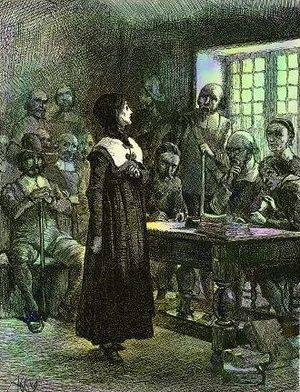Preparationism facts for kids
Preparationism is a Christian idea that says people who aren't yet Christians can take steps to get ready for becoming one. It's like preparing for a big event! This idea suggests that people should do things like reading the Bible, going to church services, listening to sermons, and praying for God's special help, called the Holy Spirit. By doing these things, a person hoping to become a Christian might become more open to receiving God's grace.
Who Believed and Questioned This Idea?
Many Puritans, especially in New England, followed this idea. Important figures like Thomas Hooker, who founded Connecticut Colony, and Thomas Shepard believed in it. Later, Solomon Stoddard and William Shedd also supported preparationism.
This idea started within Calvinism, a branch of Christianity. However, some people criticized it, saying it sounded too much like Arminian beliefs. Arminianism suggests humans have more free will in their salvation.
Some experts, like Martyn McGeown, point to William Perkins, William Ames, and Richard Sibbes as preparationists. But even Sibbes warned against preparing too much. He worried that some people might feel too burdened before they could find comfort. In New England, Giles Firmin also thought that preparationists focused too much on their own weaknesses. He felt they should focus more on the comfort of Jesus Christ.
John Cotton and Anne Hutchinson saw preparationism as a "covenant of works." This means they thought it made people believe they had to earn God's favor. This disagreement was a big reason for the Antinomian Controversy. This led to Anne Hutchinson being sent away from the Massachusetts Bay Colony in 1638. Historians still discuss why Hutchinson was banished. Some focus on politics or gender issues. But many historians who study ideas believe theological reasons, like preparationism, were key.
Historian Perry Miller described the event as a debate about what people who aren't yet Christians can do to prepare for conversion. Rhys Bezzant also sees the Antinomian crisis as a conflict. It was between Hutchinson and others, and those who defended the preparationist way of thinking. Bezzant also notes that Jonathan Edwards moved away from his grandfather Solomon Stoddard's preparationist ideas.
The hymn "Come, ye sinners, poor and wretched" by Joseph Hart shows a different view. It suggests that people don't need to prepare themselves first:
Come, ye weary, heavy laden,
Bruised and broken by the fall;
If you tarry till you’re better,
You will never come at all;
Not the righteous, not the righteous,
Sinners Jesus came to call.
This hymn means that Jesus welcomes people as they are, without them needing to become "better" first.
Why Was This Idea Important?
Michael McClymond suggests that preparationism helped balance out the idea of God's complete control. It stressed that people could and should do something while waiting for God's grace. Emory Elliott argues that it became a key part of how spiritual life and social order developed in early Puritan communities.
Martyn McGeown finds it surprising that preparationism became so popular among Puritans. Many Puritans helped write the Westminster Confession. This important document teaches that people, by their own strength, cannot convert themselves or prepare for it. This shows a bit of a difference between the popular practice and some official teachings.


